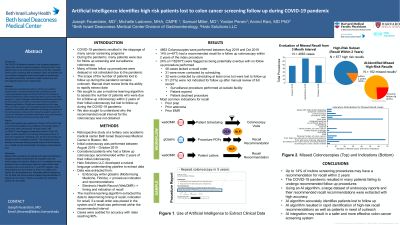Back

Poster Session A - Sunday Afternoon
Category: Colorectal Cancer Prevention
A0177 - Artificial Intelligence Identifies High Risk Patients Lost to Colon Cancer Screening Follow-Up During COVID-19 Pandemic
Sunday, October 23, 2022
5:00 PM – 7:00 PM ET
Location: Crown Ballroom


Joseph D. Feuerstein, MD
Beth Israel Deaconess Medical Center (BIDMC)
boston, MA
Presenting Author(s)
Joseph D. Feuerstein, MD1, Samuel Miller, MD2, Michelle Ladonne, MHA, CMPE2, Arvind Ravi, MD, PhD3
1Beth Israel Deaconess Medical Center (BIDMC), Boston, MA; 2Beth Israel Deaconess Medical Center, Boston, MA; 3Halo Solutions LLC, Boston, MA
Introduction: The COVID-19 pandemic resulted in the complete stoppage of many colon cancer screening programs. During this time, many patients were at risk of being lost to follow up for their colorectal cancer (CRC) screening and surveillance. Here, we describe use of an artificial intelligence driven recall system to surface high risk patients potentially overdue for repeat colonoscopy and interrogate the reasons for missed recall.
Methods: We conducted a retrospective study at a tertiary care academic medical center in continuous patients who underwent an initial colonoscopy between August to October 2019 and had a follow-up recommendation for a repeat colonoscopy within 2 years of the index procedure. A natural language understanding workflow was developed by Halo Solutions LLC in which: 1) procedure reports from gGastro (Modernizing Medicine, Florida) were converted to text files using OCR, and 2) these reports were evaluated alongside linked electronic healthcare record (EHR) data to determine the timing and indication of the recall procedure. Data was then manually reviewed to assess the reasons for missing the surveillance colonoscopy. Cases were randomly checked for accuracy, reaching an accuracy rate of 96%.
Results: 4663 colonoscopies were performed, of which 14% (n=677) had a recall recommendation for surveillance colonoscopy within 2 years of the index colonoscopy. Of those cases, 24% (n=162/677) were flagged as potentially overdue. Of the 162 cases, 48 were found to have missing colonoscopy orders, 31 were not contacted by scheduling, and 32 were lost to follow up despite at least 1 attempted outreach. The remaining 51 were also lost to follow up but upon further review, deemed not overdue following manual review of the full record (e.g., outside records documented colonoscopy, patient expired, etc.).
Discussion: Missed CRC surveillance for patients with higher risk findings or disease processes increases the risk of patient harm from missed polyps and cancers. Nearly one in six patients who were advised to have a colonoscopy within two years of their index procedure were lost to follow up. In most EHR systems, once these patients are lost to follow up, there is no safety net to identify who these patients are. Integrating artificial intelligence into the EHR and clinical practice enables rapid identification of patients at risk of loss to follow up and allows for optimizing patient care and safety.
Disclosures:
Joseph D. Feuerstein, MD1, Samuel Miller, MD2, Michelle Ladonne, MHA, CMPE2, Arvind Ravi, MD, PhD3. A0177 - Artificial Intelligence Identifies High Risk Patients Lost to Colon Cancer Screening Follow-Up During COVID-19 Pandemic, ACG 2022 Annual Scientific Meeting Abstracts. Charlotte, NC: American College of Gastroenterology.
1Beth Israel Deaconess Medical Center (BIDMC), Boston, MA; 2Beth Israel Deaconess Medical Center, Boston, MA; 3Halo Solutions LLC, Boston, MA
Introduction: The COVID-19 pandemic resulted in the complete stoppage of many colon cancer screening programs. During this time, many patients were at risk of being lost to follow up for their colorectal cancer (CRC) screening and surveillance. Here, we describe use of an artificial intelligence driven recall system to surface high risk patients potentially overdue for repeat colonoscopy and interrogate the reasons for missed recall.
Methods: We conducted a retrospective study at a tertiary care academic medical center in continuous patients who underwent an initial colonoscopy between August to October 2019 and had a follow-up recommendation for a repeat colonoscopy within 2 years of the index procedure. A natural language understanding workflow was developed by Halo Solutions LLC in which: 1) procedure reports from gGastro (Modernizing Medicine, Florida) were converted to text files using OCR, and 2) these reports were evaluated alongside linked electronic healthcare record (EHR) data to determine the timing and indication of the recall procedure. Data was then manually reviewed to assess the reasons for missing the surveillance colonoscopy. Cases were randomly checked for accuracy, reaching an accuracy rate of 96%.
Results: 4663 colonoscopies were performed, of which 14% (n=677) had a recall recommendation for surveillance colonoscopy within 2 years of the index colonoscopy. Of those cases, 24% (n=162/677) were flagged as potentially overdue. Of the 162 cases, 48 were found to have missing colonoscopy orders, 31 were not contacted by scheduling, and 32 were lost to follow up despite at least 1 attempted outreach. The remaining 51 were also lost to follow up but upon further review, deemed not overdue following manual review of the full record (e.g., outside records documented colonoscopy, patient expired, etc.).
Discussion: Missed CRC surveillance for patients with higher risk findings or disease processes increases the risk of patient harm from missed polyps and cancers. Nearly one in six patients who were advised to have a colonoscopy within two years of their index procedure were lost to follow up. In most EHR systems, once these patients are lost to follow up, there is no safety net to identify who these patients are. Integrating artificial intelligence into the EHR and clinical practice enables rapid identification of patients at risk of loss to follow up and allows for optimizing patient care and safety.
Disclosures:
Joseph Feuerstein indicated no relevant financial relationships.
Samuel Miller indicated no relevant financial relationships.
Michelle Ladonne indicated no relevant financial relationships.
Arvind Ravi indicated no relevant financial relationships.
Joseph D. Feuerstein, MD1, Samuel Miller, MD2, Michelle Ladonne, MHA, CMPE2, Arvind Ravi, MD, PhD3. A0177 - Artificial Intelligence Identifies High Risk Patients Lost to Colon Cancer Screening Follow-Up During COVID-19 Pandemic, ACG 2022 Annual Scientific Meeting Abstracts. Charlotte, NC: American College of Gastroenterology.
